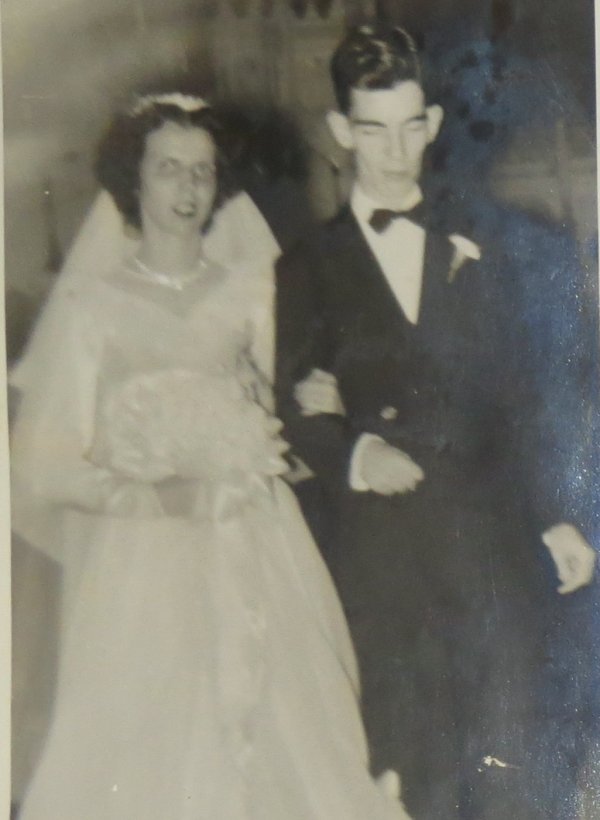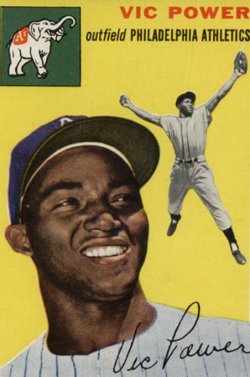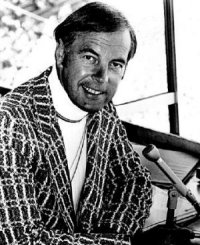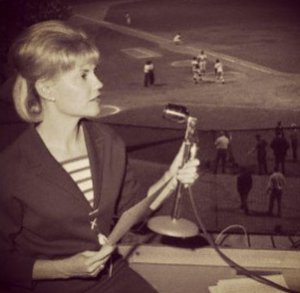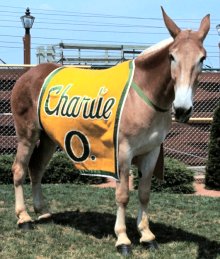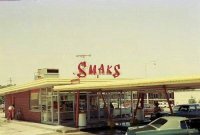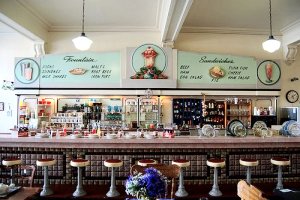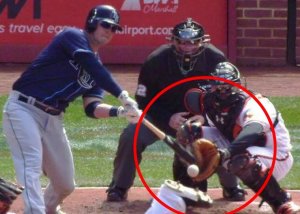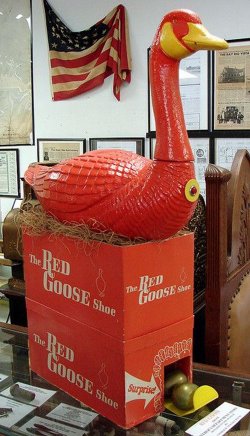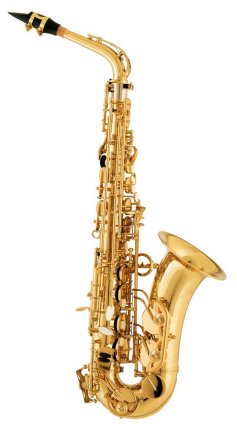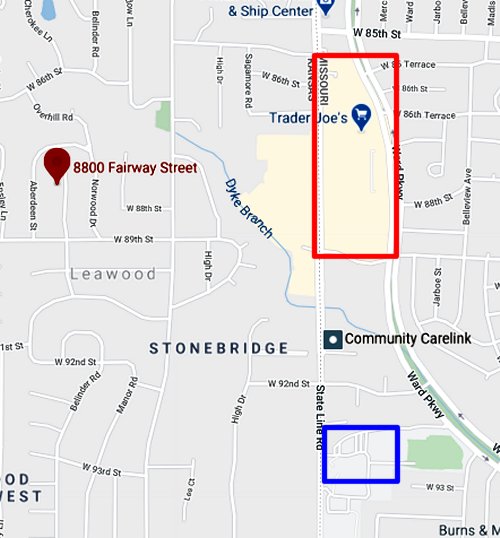Dolores Wavada Continue reading
This was the most difficult to write of the hundreds of entries in this project. I decided to set an ending date of 1970 because after I left for the army face-to-face contacts with my mom were quite limited. My dad came to see me when I was working at the Hartford, but it was only for a day at the end of a business trip. Mom stayed home. I don’t remember them visiting us at all for the three years we lived in Plymouth. They both came to Detroit once, and they did not like it at all. After my wife Sue and I moved back to Connecticut they visited a handful of times, but, except for the first trip, they spent most of their time with my sister Jamie and her family.
Sue and I visited them in 1973. After that we were too poor and too busy to travel much until I started flying much more in the nineties. I arranged a stop in the Kansas City area whenever it was feasible, which was pretty often. However, the ones when she was still alive were mostly for parties or other celebrations. I remember very little of the conversation. Also, through much of this period she was reluctant to contribute much.
In fact, I reluctantly admit that the sum total of my knowledge about my mother is pitiful. Dolores Ann Cernech was born on October 2, 1925, in Kansas City. Her parents were John and Clara Cernech. My understanding is that Clara was half German and half Polish. Cernech is a Croatian name. John’s mother was at least partly Irish.
Mom grew up in Kansas City, KS. In 1943 she graduated from Bishop Ward High School, which was less than a mile from the Cernech residence at 40 N. Thorpe. Students in her graduating class were asked to specify who their favorite band leader was (!) and what they hoped to become in life. Dolores Ann Cernech answered “Tommy Dorsey” and “Private Secretary”. The latter seemed like a peculiar response in the age of Rosie the Riveter.
I am not sure how she met my dad, who was a year older and went to high school in Atchison, KS, about fifty miles away. My understanding is that they were already acquainted before my dad enlisted in the army in 1942.
I wish that I had learned more about what my mom did in the period between her graduation and Jim Wavada’s discharge from the army in February of 1946. I have a vague recollection that she had worked in a clerical position somewhere, but she must have been communicating with my dad while he was in the army. They were married on September 1, 1947, which was eighteen and a half months after he was discharged from the army. It definitely was not a shotgun wedding. It was officiated in St. Peter’s by my dad’s brother, whom I knew as Fr. Joe. I did not show up until eleven and a half months later.
What transpired in the year and a half between my dad’s discharge and the wedding? Decades later he disclosed two nuggets of information about that period: 1) Mom’s father was against the marriage, but Clara persuaded him that it was for the best; 2) He might have gotten into serious trouble if he did not get married.1 He also mentioned something about pinball machines, which in those days were common in bars.
Dolores and Jim took up residence in the Cernech’s house in KC KS. I am not sure if John and Clara lived there at the time. It was not a large house, and I know that at some point John, an employee of the Boss Glove Company, was transferred to Grand Island, NE. I have dozens of questions that I should have asked while they were still alive. Did they have a honeymoon? If so, where? Presumably my dad worked at BMA. Did mom work, too, at first? How did they get around? They did not have a car until 1954.
I have no doubt that my mom ran the household’s finances from day one. My dad was nearly incapable of balancing a checkbook. For the most part she was very frugal at least during the time that I lived at home. My dad bought suits and other dress clothes for work. My mom sewed most of her own clothes.
I am equally certain that my mom took on any task that involve any kind of a machine or any tools. My dad had the least mechanical aptitude of anyone whom I have ever encountered. What about yardwork? The house on N. Thorpe had a very small yard. I doubt that the family owned a power mower. So, somebody must have mowed the grass with an old-fashioned push mower. Uncle Rich might have helped, but my money is on mom. I can’t imagine my dad doing it even once.
Life in KC KS 1948-54
The first big event after the marriage was my birth on August 17, 1948. It must have been a horrific shock for her to see my mangled face. I have been told that the physicians performed the first surgery shortly after birth. There were follow-up procedures before I started going to school and another one after I completed the eighth grade.
My parents almost never brought this up. They had obviously discussed the matter and decided that they wanted me not to fret about my appearance. That certainly succeeded. Very few people whom I have met paid as little attention to appearances as I did.
I remember one trip to the shoe store when I was quite young. The salesman talked mom into purchasing arch supports for my very flat feet. I think that that only happened once. After that off-the-rack was good enough. I did not start using arch supports regularly again until I was in my seventies. Those came from Walmart, cost $10, and could be worn with any shoe or none.
I cannot remember my grandparents ever living in the Cernech house with us. Richard Keuchel2, Clara’s youngest brother, lived with us. He kept to himself most of the time, but I remember that he occasionally brought me a small present or gave me some coins for baseball cards.
I vaguely remember mom taking me with her on a few shopping trips. Most of the time she probably walked to Central Ave., a lively retail area just a couple of blocks from the house. We might have taken an occasional bus or “street car” (trolley) as well.
The one type of excursion that impressed me the most was trips to the library. I was allowed to pick out my own books in the children’s section. My tastes primarily ran to westerns. I don’t remember her reading these books to me, but she must have, at least at first. I remember also that I had a rather large book that had fables in it. The only one that I recall was about an ant and a fiddle-playing grasshopper.
My recollection, which is probably at least a little off, is that I had the run of the neighborhood by the time that I was four or five. I am pretty certain that I walked to both kindergarten and first grade, and I remember spending a lot of time with my friends in the neighborhood. I don’t think that I was allowed to cross the alley in back of the house by myself, but I remember playing with friends up and down N. Thorpe Street. I also remember our telephone number, FAirfax 9890.
I remember attending several weddings and funerals of mom’s relatives. However, we had no automobile. Maybe those took place after we moved.
Did my mom have any friends? I don’t recall any. She knew everyone on N. Thorpe. She grew up there. Someone told me that she selected one of her classmates from Ward High to be her maid of honor. I have a photo of the wedding, but the people are not identified. I think that the same lady might have been my godmother, but she did not have any role thereafter in my mother’s life.
Maybe looking after me was all that mom could handle. Four instances came to mind that might have made her wonder what she had gotten herself into:
- In addition to all of the trips to the hospital, she also arranged sessions for me with a speech therapist. This was apparently in anticipation of difficulties in speaking due to the amount of plastic in my upper lift. I don’t remember ever having trouble articulating, and I did well in the formal presentation required by the therapist.
- I related the story here about the rock-thrower whom I beat up in kindergarten. I received no punishment that I remember. Mom and the teacher explained that what I did was wrong, but I don’t remember their reasoning. My reasoning was that “he had it coming.” In westerns this happened to people all the time.
- One morning I made a scene at Mass because The Lone Ranger was on television3, and I did not want to miss it. I think that mom had to escort me out of the church on that occasion, but I am only guessing.
- The problem that I had with the box of letters in first grade is also documented here. I would really love to know what mom thought when the nun informed her that I seemed incapable of reading and writing.
The only other vivid memory that I have of life on N. Thorpe was of mom painting a fruit tree freehand on one of the walls in the kitchen. Everyone praised it. In retrospect it made me wonder what else she could have accomplished if she were not so devoted to our small family. Unfortunately I inherited my artistic ability from Jim.
There might have been some trips. I think that the two of us took a train trip somewhere in the south. Clara (and maybe John) may have also been along. It seems to me that we spent some time in Hot Springs, AR. I am pretty sure that we also visited mom’s relatives in the Dallas area either on that trip or a separate junket. The mother’s name was Jule Palmer or something like that. Either or both of these might have been after the move, but I don’t think so.
Mom loved animals. I remember a dog named Trixie, which was, I am pretty sure, Mom’s pet before she got married. Trixie must have died before we moved. I have no recollection of her at our new house. I am pretty sure that we also had a pet parakeet named Mickey before we moved. Someone taught him to talk, probably mom.
Prairie Village
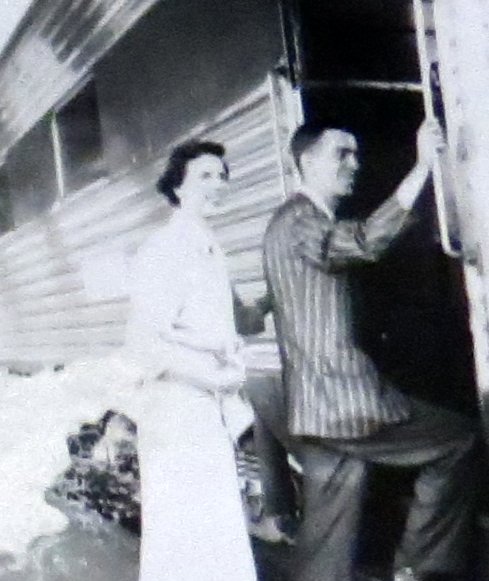
In early 1955 the three of us moved to 7717 Maple, Prairie Village, KS, about twenty miles south of the house on N. Thorpe. In addition to setting up a household in a suburban location, mom almost immediately had to deal with my childhood illnesses—chicken pox, measles, and whooping cough—that I contracted one after another. Fortunately, that was pretty much the last time that I was sick until I contracted the Russian Flu during exam week in college.
Evidently mom’s father did not think much of the blue house on Maple St. He called it “a cracker box.” My dad told me much later that my mom uncharacteristically retorted, “Yes, but it’s our cracker box.” Well, theirs and the bank’s.
I remember that mom took me to the doctor to receive the smallpox vaccine. I have always hated the idea of injections, and I dreaded this. I had to return for a second (and maybe a third) vaccine because the first one “didn’t take.” The second one did not either. I never got that little volcano-shaped scar on my arm. For the only time that I can remember mom took me aside and told me in a deadly serious tone that I must NEVER forget what she was about to tell me. If ever there was another outbreak of smallpox, it was critical for me to receive the vaccine again.
I spent no time in the hospital while we were living in Prairie Village, but I spent a lot of time at the doctor’s office. I ran into a shopping cart at the grocery store one day. It did not require stitches, but the mark is still visible just a quarter of an inch from my right eye. I ran into a parked car on the lot of Queen of the Holy Rosary during recess. I dodged the tag, and the nineteen stitches in my mouth were a badge of honor. I got four more stitches when I ran into the barbecue grill in our backyard while catching a popup that my dad threw to me. While returning a punt on the football field my nose got smashed and bent a little. On all of these occasions mom drove me to see Dr. Battey, our family physician. On one of the later occasions he told her that my head was held together by catgut.
I almost forgot one incident. Mom insisted that I take the free swimming lessons offered at the PV public pool. I rode my bike to the pool for the morning lessons. One day a German Shepherd came running out of a house on my left, growled, and chomped me on my leg. Someone called mom, and she came and got me. I don’t know how many stitches were required. The dog did not have rabies or anything else. He just got loose that day.
I hated the swimming lessons because I got so cold that my teeth chattered. Also, that was where I realized my footprints looked like they were made by a duck with toes. However, I later was glad that I learned how to swim.
When my myopia became evident in the third or fourth grade, mom took me to the optometrist. Since then I have seldom been seen without my specs unless I was in water or playing football.
My mom drove me to many activities. While writing this I began to wonder when and how she learned to drive, and how she got her license. Maybe she learned before she got married.
Aside from my tendency to run full-speed into inanimate objects, I did not cause many problems for her. She never helped me with homework, but I didn’t need it until I got to the chain rule in calculus class. She didn’t need to nag me to do it. I got tired every evening and voluntarily went to bed at about the same time. She never had to wake me for school. I was usually awake before she was. I took the bus to school, and I was always ready and waiting for the Bluebird.
What she did help me with were projects. I remember that we had to make a map of a state or country out of papier mache. I picked France. I was making a big mess of it until she stepped in. She also helped out with my years in scouting. She was an excellent den mother for a while; all the guys said so. When I had trouble growing bean plants for the Nature merit badge, she gave me a tip (I don’t remember its nature) that allowed me to succeed. She also made a costume of St. Peter for me for wear for an all-saints version of Halloween.
In retrospect I find it incredible that she was willing to get up to drive me to Queen for the 6am Masses for which I was a server and then pick me up when it was over. She also carted me around to sporting events. I often stayed after school (and therefore missed the bus) for band practice or great books or safety patrol or scouts or the school newspaper or football or basketball. Sometimes I walked home, but at least half of the time I engaged mom’s taxi service.
I do not remember Mom giving me much advice beyond basic Catholic principles. However, I very clearly remember her reaction when I got into a fight with Michael Bortnick. He was my age but considerably bigger. I came into the house crying and told mom that he beat me up, and he was bigger than I was. She merely replied, “Then you should have avoided fighting him.” I remembered that and applied it with great success throughout my remaining life..
As soon as I was old enough I got to play on a team in the local 3&2 baseball program that served as a Little League for Johnson County, KS. The team was sponsored by Sunflower Drugs. I undoubtedly made the team through the intercession of Don Wood’s father. This was the last summer before I got glasses. I was a good fielder and base runner, but I batted .000. I only hit the ball once—on my very last at-bat.
The next summer I did not make the team. I was ready to quit baseball, even though I really wanted to play. I was even more depressed than I was when I missed a catechism question in second grade (described here). I was totally unprepared mentally for failure.
My mom told me that I should not quit; there were plenty of other teams. It was good advice. I somehow learned about the team sponsored by Bauman’s Red Goose Shoes. I had a good time on that team, and I even got quite a few hits.
Mom did not like the idea of me playing football in the seventh and eighth grade, but she allowed me to go out for the team. Even after she had to take me to the doctor after I got clobbered on a punt return, she let me continue. It meant a great deal to me.
I remember that for a short period we (I am not sure if Jamie was involved) spent a few minutes every evening reading the Bible from start to … well, I think that we finished Genesis before the project was abandoned. I would love to have heard that decision being made.
Like millions of other Americans our family owned a nicely bound Bible with those incredibly thin pages. Ours, of course, was the Douay-Rheims version, which is the only English version recognized by the Catholic Church. It had a dozen or so brightly colored illustrations. I don’t know what happened to it.
My mom was friendly with all of the neighbors, but the only ones that she socialized with were the Leahys. I remember that once when I was in second or third grade she was late getting home from somewhere. For perhaps the only time ever I was all alone after the school bus dropped me off. I started crying, and Jean Wallace, the lady with three kids of her own who lived directly across the street, calmed me down.
At some point we procured a phonograph player and a few records, probably 78s, which in those days were made of very brittle shellac. My dad’s favorite song was Eddie Fisher’s version of “Oh, My Papa”. I was playing it one day. When I took it off the turntable, I dropped it, and it broke. I was very upset, but mom consoled me.
The only television shows that I remember my parents watching were Your Hit Parade and Perry Como’s show. As the English say, my mom fancied Perry. We watched a lot of other shows, too, but none of them stand out in reference to my mom.
When she was working, which seemed to be doing all of the time, she often broke into a song. The one that she sang the most was the Andrews Sisters’ version of “Dance with a Dolly”4.
Jamie
One day shortly after we moved to PV my parents announced to me that they were “praying” to have another child5. I thought that this was a great idea. I would have a baby brother whom I could boss around and eventually teach “the ropes”. Imagine my shock when dad told me that mom had given birth to an girl on January 4, 1956. Did they actually pray for a girl? Why?
Jamie was nothing like me. Her face was decidedly not mangled. By the time that she was a few years old she had blonde hair6. Even I thought that she was good looking. Furthermore she avoided crashing into objects much better than I did. Her visits to Dr. Battey’s office were always routine.
I was approximately seven and a half years older than Jamie. I figured that she could figure out pat-a-cake on her own, and so I mostly ignored her. However, we often watched Captain Kangaroo and Romper Room together before I went to school.
The fact that mom had another little one to mind nearly all the time that I was in grade school made it even more remarkable that she was willing to drive me to all my activities. I think that it also explained why she let me roam the neighborhood with no evident supervision. She even let me shoot off firecrackers on the Fourth of July.
Decades later Jamie told me that as she was walking to kindergarten at Tomahawk School some older boys accosted her. I had heard nothing about this, but I was often oblivious. I wonder what I would have done if I knew about this. I would have been in the eighth grade, at least two years older than anyone at Tomahawk.
I remember that I asked mom one year whether I could help with playing Santa Claus on Christmas eve. She let me do it. I don’t remember any details.
Our pets have been discussed in some detail here. My mother’s role was central. My dad had no use for animals. He was obviously either fearful of or disgusted with them to an extent that I never saw in any other person. Mom made sure that they were
Mom handled the tricky situation that begin with the appearance of a dachshund (eventually named Sam by me) with no tags brilliantly. She allowed him to go back to his owners on his own, but for some reason he seemed want to stay at our house. She advertised somewhere that we had him, and eventually someone claimed him. Jamie was crushed, and I was also upset, but mom explained to us that we had no right to take him from the other family.
My grandmother Hazel came to the rescue by giving us her pet dachshund Tippy. However, he seemed to want to spend most of his time with me.
Leawood
At the end of the 1961-62 school year the Wavadas moved south and east a few miles to 8800 Fairway in Leawood. Once again we were in a new parish, Curė of Ars. Jamie started grade school in September at C of A, and I started my freshman year at Rockhurst High School. So, this was a new experience for everyone.
I don’t recall having many conversations with my mom. I cannot remember asking her any probing questions. My recollection is that on most days she worked pretty much from the time that she got up until the supper dishes were in the dishwasher, and all of the food and accoutrements had been put away. The one major incident in my youthful life that she had to deal with was the time in 1964 when she had to accompany me to traffic court. Nothing came of it, but I did grow up a little bit that evening.
My mother was a great cook. We enjoyed delicious meals almost every day except, of course, on Friday. My parents decided that instead of eating out occasionally, we would have steak on Saturday evening. My dad grilled them over charcoal on the patio in good weather. If the weather did not allow that, mom broiled them. My favorite meal, by far, was fried chicken7. We had it once a week, usually on Wednesdays.
I was not big on breakfasts. Cereal usually sufficed for me. A special treat was “pigs in the blanket”, which were link sausages baked inside of biscuits that had been folded over them.
My lunches were the envy of everyone in my classes. Usually I had a ham sandwich, an apple or other fruit, a small bag of chips, and a thermos of soup. Most kids had to put up with cheese sandwiches or PB&J with little or no variety. I went to a Catholic school; many of those moms were making at least a half dozen lunches. In high school I usually ate lunch in the cafeteria.
Trips
My dad worked in the sales department at BMA. Every few years my dad and mom would take a business trip together for big meetings. They were generally at a resort or in the vicinity of special events. They were usually gone for the better part of the week. Sometimes they hired someone to take care of Jamie and me. I had very little interaction with these women. I remembered that the suppers that they prepared with uniformly disappointing.
I found four photos that were labeled “Easter 1957” by the company that developed them. At the time I was finishing second grade, and Jamie was a little over one year old. They show my mom and dad stepping onto a train. Based on her outfit, this must have been a business trip on which she joined him. Someone must have taken the photo. I am guessing that it was Clara Cernech. She probably took care of us while they were gone.
My mom did not regale us with tales of these adventures. I remember that she was most impressed by the one in Banff, Canada. I have no recollection of her talking about any of the other places, and I doubt that I pestered her for details.
Details about our family vacation trips have been provided here.The four of us took one big vacation to the east coast while we were living in PV. Mom took over the driving for a part of the trip. That was the only time that I ever saw my dad riding shotgun. Most of her time was spent with Jamie, who was only three or four years old. Our other trips were usually to Minnesota. Mom must have enjoyed the breaks from cooking and cleaning, but she mostly seemed to busy herself with other things.
Health
My mom was in good shape. She did not smoke. She drank very little, and ate mostly fresh foods in moderate amounts. She also exercised. I remember her watching Jack LaLanne and his dogs, Happy and Walter. I never partook of these activities, but I remember being awestruck when Jack nonchalantly did vertical pushups on a step on a ladder.
She also played golf a little. She played with my dad and me a few times, and while I was waiting to get drafted we played as a twosome. I think that she played with other ladies off and on. She was a good athlete, but her golf swing got worse the more that she played. In the end she bounced her torso up and down on every swing. This peculiar motion made it very difficult to hit the ball cleanly. I always suspected that advice from my dad was responsible for the degradation of her game. I don’t know how much (or even if) she played after I entered the army.
She wast 5’7″, which was considered quite tall in the forties. She was skinny enough to be nicknamed bird-legs in high school. She never got fat or even a little pudgy.
I only remember mom being sick a few times, mostly during the Christmas season. Overworking and the pressure probably got to her. She did have a few issues. Her “sinuses” bothered her a lot. She took Dristan tablets for the “sinus headaches”, but they did not help much. I also remember some kind of saltwater purge that she did. When my dad quit smoking many years later this issue disappeared almost immediately.
She also suffered from varicose veins. I don’t know any details. She might have also had diabetes. I know that her mother did. Mom never complained about anything, and she never let any symptoms slow her down.
When she was in middle age she started to have problems with memory and confusion. It was not Alzheimer’s, but the doctors never were able to pinpoint what caused her so much difficulty. My dad said that she asked him one time, “Jim, what did I do wrong to deserve this?” Of course, he had no answer.
When she died in 1998 (described here) my dad did not request an autopsy to determine what the source of her problems was. I rather hoped that he would, because I wanted to do something about it if I inherited it. I am older when I write this than she was when she died. So, I guess that I did not get it.
The biggest regret in my life is that I squandered the opportunity to know this wonderful woman better.
What I inherited from my mom:
- Skin color
- Hair
- Build
- Social reticence
- Love of music (but different taste)
- Work ethic
- General demeanor
- Aversion to arguments
- Early bird.
1. The fact that I asked no more questions is, to me, convincing evidence that I must be somewhere on the autism spectrum. I have never asked people about their lives. Although I have always been good at remembering names, I almost never remember the names of relatives of acquaintances, even if I have seen them many times. For example, I have a great deal of difficulty remembering names of members of Sue’s family. I know my own cousins, but I could not name any of their children. It never really occurred to me that I was excessively solipsistic. I just considered myself less nosy than most. In my defense I always try to think of the potential effect on others before I do something, and I never deliberately do anything that might inflict pain on someone else.
2. Uncle Rich apparently died in 1972. My recollection is that he worked for a company called Gustin Bacon Mfg. that manufactured pipe joints and, for a time, air horns for trains. I have no idea what he did there. I also don’t know if he remained in the house on North Thorpe after the Wavadas moved south in 1955.
3. I don’t know when we purchased the TV, but I was a big fan of the Howdy Doody Show, and I am almost certain that I watched Hopalong Cassidy, which only ran until 1952. I cannot picture our television in the house on N. Thorpe, but we must have had it there.
4. This was a bizarre song: three women fantasizing about dancing with another woman. “All the fellows wishing they were me.”
5. This naturally raises the question of whether my parents employed birth control. The Church has never sanctioned anything besides the “rhythm method” for birth control. If that was what they did, they were certainly good at it. I was conceived a little over two months after their marriage. Jamie was conceived shortly after they moved to a new house with a spare room.
6. It turned quite a bit darker by the time that she went to school.
7. When I started cooking for myself I almost immediately tried to fry chicken. I never got it quite right. It is difficult and time-consuming. The spattering of grease makes a mess. I eventually just gave up. It did not seem to me to be worth the effort.
8. In my dad’s estate I found a used ticket for Super Bowl III and one for the Rose Bowl in 1970 that featured Michigan and Southern Cal.

